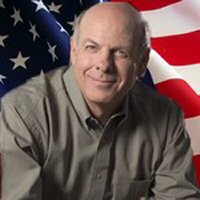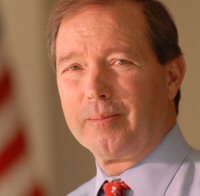|
|

|
Candidates for United States Senator
Two United States Senators are elected to six-year staggered terms by the entire state. Candidates must be at least 30 years old, a citizen of the United States at least nine years, and a resident of the state from which elected. The United States Senate has 100 members. One New Mexico Senate seat is up for election this year. The annual salary for U.S. Senator in 2008 is $169,300.
Steve Pearce, Republican

- What are the three top economic concerns facing the country? What actions would you take as a U.S. Senator to address these concerns? (100 words)
1) Congress must create a successful business environment that provides growth opportunities for New Mexican businesses. I support a low tax structure. Tax cuts create jobs. Raising taxes puts a downward pressure on the economy that results in lost jobs. 2) We must lower energy costs. I introduced the Clean Energy, Lower Prices Act to allow drilling on the Outer Continental Shelf and Alaska. It takes royalties from oil drilling leases and accelerates investments in renewable energy. Nuclear energy must be expanded. 3) Providing a world class education provides higher living standards as US companies increase competitiveness in the global-market.
- What is your position on the war in Iraq, and what actions should the United States take? (100 words)
Iraq is one of the many fronts in the war on terror. Congress must listen to the military commanders on the ground to ensure Iraq does not become a terrorist training ground. Iraqi forces are now securing 10 of 18 provinces with more to be controlled by the end of 2008. As Iraq stabilizes, more American troops can be rotated home. The cost of failure in the war on terror will be the fall of over 50 moderate Arab regimes. If the terrorists gain control they have promised to pull oil off the world market, causing economic and social upheaval.
- As both major party presidential candidates have supported legislation to deal with global climate change, this issue is expected to come up in the next Congress. What legislation, if any, would you support to tackle this issue? (100 words)
The real question is, will the U.S. take unilateral action to reduce carbon emissions. China and other countries are not considering action so the global effect of our efforts will have minimal impact. Are we willing to bring down our living standards and lose jobs to support actions that may have no effect on climate change? In Europe, the cost of cap and trade is punitive to consumers and businesses. My bill the Clean Energy, Lower Prices Act will lower gas prices in the short-term and make us more energy independent in the long-term through investments in renewables and nuclear.
- Should Congress take steps to ensure that all people living in the United States have access to affordable, quality health care? Please explain. (100 words)
Fundamental changes to America's healthcare system must be made to control rising costs. I oppose an attempt to socialize health care. I support investment in disease research, tele-medicine, ending frivolous lawsuits, access to home care, replacing emergency care with preventative medicine, promoting healthy lifestyles, and teaching people how to manage their diseases to lower healthcare costs.
Tom Udall, Democrat

- What are the three top economic concerns facing the country? What actions would you take as a U.S. Senator to address these concerns? (100 words)
Our top economic concerns are: making the economy work again for hard-working Americans; helping the middle class being hurt by rising food, gas, health care and education costs; and getting the nation's finances back in order. I will support legislation to provide a tax credit to companies that maintain or increase the number of workers in America and will end the tax breaks for companies that outsource American jobs. I will also work to expand college scholarships, reduce energy costs by cracking down on oil speculators and expanding alternative energy, and reduce the deficit by cutting wasteful spending.
- What is your position on the war in Iraq, and what actions should the United States take? (100 words)
After 9/11, I supported sending troops into Afghanistan to stop Osama bin Laden and Al Qaeda. I opposed the Iraq war because it took us away from our mission. We need to start bringing our troops home from Iraq safely, and refocus on the resurgent threat in Afghanistan. We need to stop spending billions every month in Iraq that could be used at home. And we need to treat our troops with the respect they have earned. That's why I have worked for better health care for our veterans and fought for the new G.I. Bill.
- As both major party presidential candidates have supported legislation to deal with global climate change, this issue is expected to come up in the next Congress. What legislation, if any, would you support to tackle this issue? (100 words)
We face the twin challenges of global warming and rising energy costs. I introduced legislation in Congress to reduce global warming pollution, while re-charging our economy with new alternative energy jobs. My energy plan addresses immediate concerns by cracking down on speculation and exploring responsible drilling, but also addresses future energy needs by investing in alternative energy. We need increased conservation, and investment in a New Energy Economy, providing long term tax incentives for wind and solar power so America can become a world leader in these and similar industries. There is no single answer - we must do it all.
- Should Congress take steps to ensure that all people living in the United States have access to affordable, quality health care? Please explain. (100 words)
I support affordable, accessible health care for every American. There are three things I want to do right now to get the job done. One, allow every small business access to the same health care plan available to members of Congress and federal employees. That means everyone will be paying the lowest rate like the largest businesses. Second, allow individuals aged 55-64 to buy into Medicare. Some in this age group are retired and their previous employers don't continue health insurance for them. And three, make sure every child has health insurance by expanding the children's health insurance program.
Return to top of page
|



